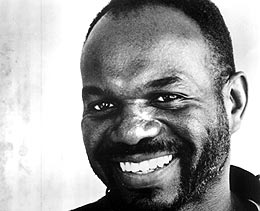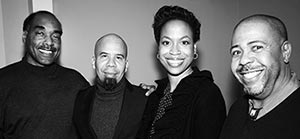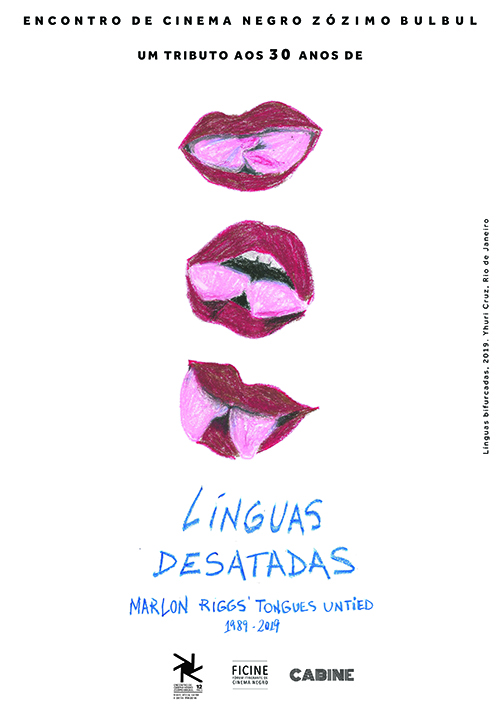 MARLON RIGGS CRITICAL RESOURCE PAGE MARLON RIGGS CRITICAL RESOURCE PAGE
This page offers a varied collection of resources on the life and works of Marlon Riggs. We have commissioned essays
by scholars on the use of his films in the classroom as well as the influence of his documentary vision and practice on subsequent media artists.
There are links to scholarly and popular articles about Riggs’ oeuvre and reactions to his most controversial
film, Tongues Untied.
Recognizing Marlon Riggs
In December 2022, Tongues Untied joined the distinguished
group of films selected for the
Library of Congress National Film Registry. Films are selected based on their cultural, historic and/or aesthetic importance.
ARTICLES
Marlon Riggs, Ancestor by Jericho Brown, the Current - The Criterion Collection
Blackness, Gayness, Representation: Marlon Riggs Unpacks It All in His Films by Wesley Morris, New York Times
Movies: Marlon Riggs Retrospective
by Hilton Als, The New Yorker
Queer & Now & Then: 1991 by Michael Koresky, Film Comment
25 years after his death, Marlon Riggs’ legacy explored in BAMPFA series by G. Allen Johnson, San Francisco Chronicle
An Introduction to the Resources
I Shall Not Be Removed, the only documentary on Riggs’ life and work can be streamed in its entirety for
free on this page below. It provides an intimate portrait of the groundbreaking documentarian. We also provide a link to watch the historic event in February 2013 celebrating
Riggs at Harlem’s Schomburg Center for Research in Black Culture. There are opinion pieces by Riggs about his media activism, his fight for racial
and gender justice, against homophobia and racial essentialism.
The Marlon Riggs Papers, a wealth of production notes, letters and media
have very recently become available at Stanford University; our site provides
information about how to access this valuable new archival resource.
Schomburg Center for Research in Black Culture

A Marlon Riggs Retrospective,
February 26 2013. Panel (from left to right) included Cornelius Moore (California Newsreel), moderator Steven G. Fullwood, Rhea Combs, and
Al Cunningham. Streaming under the auspices of
the National Black Programming Consortium.
On Marlon Riggs: The Artist and His Influence by Rhea Combs.
Rhea Combs is a Curator specializing in the Media Arts at the Smithsonian National Museum of African American History and Culture and
author of Exceeding the Frame: Documentary Filmmaker Marlon T. Riggs as Cultural Agitator.
Teaching Blackness: Marlon Riggs' Place in Black (Gay) History
by E. Patrick Johnson
E. Patrick Johnson is Prof. of Performance Studies and African American Studies at Northwestern University. He is the co-editor of Black Queer
Studies: A Critical Anthology, and author of Appropriating Blackness: Performance and the Politics of Authenticity, Sweet Tea: Black Gay
Men of the South – An Oral History, and Black. Queer. Southern. Women – An Oral History.
Marlon Riggs Papers at Stanford
The Marlon Riggs Papers in the Stanford University Libraries documents the life and career
of the documentary director, Marlon Troy Riggs (1957-1994). The majority of
the materials in the Collection are from the period between 1984 and Riggs' death in 1994,
the decade of his concentrated film-making activity, as well as more
personal materials from the late 1970s onwards. The Collection consists of
manuscript papers, films, and videotapes in various media formats, over 110 linear feet
of material in all. The manuscript papers include notes, correspondence, writings,
and office records. Their meticulous organization reflects Riggs’ care in documenting
his own work, ranging from his production process to the reception and controversies
surrounding his work.
For example, one important topic documented in the Papers is
the bold, barrier-breaking use of the fair use copyright exemption in Riggs' sampling
of broadcast materials in Color Adjustment. CBS challenged
Riggs over the use of footage from the Amos 'n' Andy show to document racial stereotyping
in broadcast television. The collection includes footage Riggs obtained of the
"The Rare Coin" and other episodes, interviews and voice-overs related to his
portrayal of the show, and tapes which reveal his editing of this material.
These documents are supplemented by files that provide information about the
acquisition of materials, interviews, mixing logs, production notes from the
Amos 'n' Andy television show, and the difficulties in obtaining copyright clearance
for materials used in Color Adjustment. Similarly, the collection documents the
national debate unleashed by Tongues Untied with respect
to public funding of controversial works and other critical moments in the reception
of Riggs’ creative work. In total, the Riggs Papers provide essential documentation
for research on Riggs’ life and oeuvre.
The Collection is available to the public for research use in the
Department of Special Collections, Green Library,
on the Stanford University campus.
A complete guide
to the collection is available through the Online Archive of California.
Please consult the on-line guide to requesting materials
and reprographic services
for more information on use of the Riggs Papers.
Two Opinion pieces by Marlon Riggs
Right after the 1991 public TV broadcast of Tongues Untied,
in the POV series, Riggs criticized PBS for its cowardice
in the face of censorious Congressional attacks which demanded that PBS and
NEA funding be eliminated. He also lamented the lack of support from mainstream
African American leadership and opinion-makers. Riggs’s article appeared in
the August 12, 1991 edition of Current, the publication
dedicated to public media.
When 1992 Republican presidential hopeful Pat Buchanan illegally excerpted a section
of Tongues Untied in a campaign ad, Riggs responded in a October 6. 1992
New York Times op-ed criticizing the demagogic use of male homosexuality and race
to frighten segments of the U.S. public. Riggs entitled the piece
“Meet the New Willie Horton” to reference another fear mongering campaign ad
from the George H.W. Bush's 1988 presidential campaign.
An Interview with Marlon Riggs
Riggs’ interview provides the most illuminating and incisive window into
his overall perspectives on race, gender, sexuality, social change and
media representation.
“Tongues Untied Lets Loose Angry, Loving Words: An Interview with Marlon Riggs”
by Robert Anbian, Release Print, (March 1990)
The Controversial Line in Tongues Untied
Posted here is a review of Tongues Untied by Black gay critic, Cary Alan Johnson
who called it “the film we’ve been waiting for”. He praises its innovation and complex
and intimate portrait of the Black gay experience. He lauds how it
“skillfully draws the connection between the oppression and anger of
African American gay men and that of the Black community as a whole”.
However the film’s last line, “Black Men Loving Black Men is the Revolutionary Act”
raised questions for him upon discovering that
Marlon Riggs’ partner was white. Riggs addressed the complex meaning of the statement in the aforementioned Release Print interview; however,
it continues to be brought up after screenings of the film.
Cary Alan Johnson, “Not in Knots: Tongues Untied is the Black Gay Official Story.”
Gay Community News (Boston, February 25-March 3, 1990).
Tributes in Brazil
In October 2019, Brazil’s largest Black film festival Rio’s
Encontro de Cinema Zózimo Bulbul, pesented tributes to Marlon Riggs. Organized by senior curator Janaina Oliveira
and
Bruno Duarte of Cabine, the 30th anniversary screening of Tongues Untied took place at the Odeon, an historic movie palace
(Riggs’ final work, Black Is…Black Ain’t was shown for the first time in Brazil followed by a panel discussion with Cornelius Moore (California Newsreel), Janaina Oliveira (Encontro de Cinema Negro Zózimo Bulbul) , Bruno Duarte (Cabine), Rhea Combs (National Museum of African American History and Culture), and Heitor Augusto (Independent curator and critic) . Bruno Duarte was the producer of the Brazilian Portuguese subtitles for both Tongues Untied and Black Is…Black Ain’t and award-winning artist Yhuri Cruz made a commemorative poster for Tongues Untied.

Other Resources
There is a chapter on Marlon Riggs in the book Queer Pollen: White Seduction, Black Male Homosexuality, and the Cinematic by David Gerstner. The other chapters are
on writers James Baldwin and Richard Bruce Nugent.
Study guide for Black Is...Black Ain't, Transcripts
for Ethnic Notions,
Color Adjustment, and
Black Is...Black Ain't.
 ANTHEM, AFFIRMATIONS and NON, JE NE REGRETTE RIEN (NO REGRET) ANTHEM, AFFIRMATIONS and NON, JE NE REGRETTE RIEN (NO REGRET)
9 minutes, 10 minutes and 38 minutes,
1990-1992
A compilation of 3 works by pioneering filmmaker Marlon Riggs addressing issues of black gay male identity and
confronting HIV/AIDS.
 BLACK IS...BLACK AIN'T BLACK IS...BLACK AIN'T
87 minutes,
1995
Marlon Riggs's final film debates Black identity, white critiques, sexism, patriarchy, homophobia, colorism and cultural nationalism.
 COLOR ADJUSTMENT COLOR ADJUSTMENT
88 minutes,
1991
Marlon Riggs' study of how network television absorbed deep-seated racial conflict into the non-threatening formats of primetime
television. Clips from Amos 'n' Andy, Good Times, Roots and The Cosby Show among others are intercut with interviews with
producers, cultural critics and actors.
 ETHNIC NOTIONS ETHNIC NOTIONS
56 minutes, 1987
Scholars shed light on the origins and consequences of anti-Black stereotypes in popular culture from the Antebellum
period to the Civil Rights era.
 TONGUES UNTIED TONGUES UNTIED
55 minutes, 1989
A landmark and controversial personal documentary essay on experiences of black gay men and the search for identity. It has been critically
acclaimed as one of the most important documentaries of the 20th century.
|







